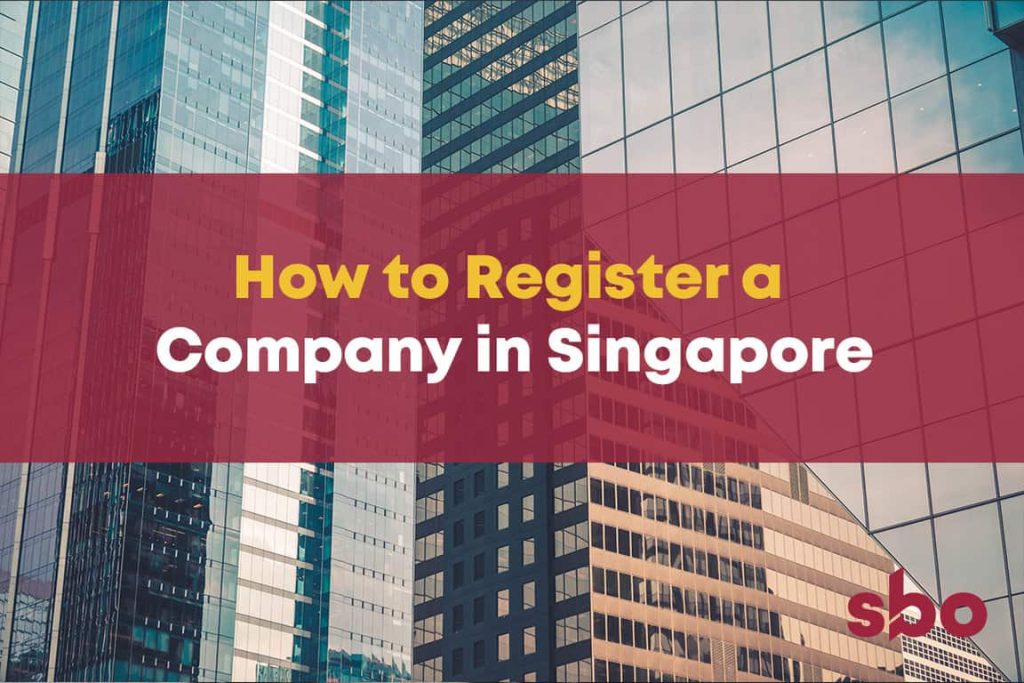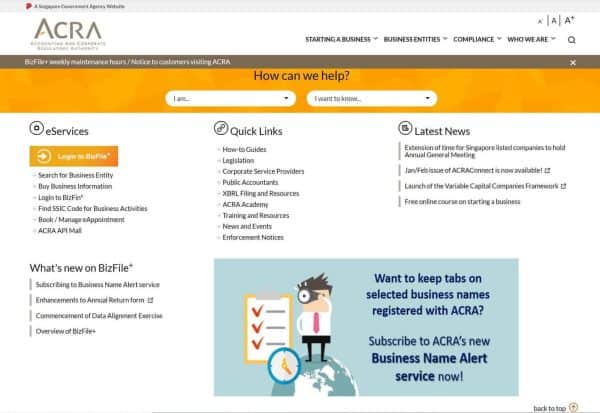How to Register a Company in Singapore: A Complete Step-by-step Guide
Get your business up and running in a matter of days.

Singapore is one of the most business-friendly countries in the world. In 2019, Singapore came in second in World Bank’s ease of doing business index, due to our location, tax regime, streamlined set up process, a professional workforce, flexible immigration policies, world-class infrastructure and a stable government. It’s no wonder even global companies like Dyson are moving their headquarters here.
But to the uninitiated, learning how to register a company or business in Singapore can still be a daunting task, especially when there may be legal implications or financial loss if things are not done right. We’ve put together a step-by-step guide to help you along.
Before you register a company
Things to consider before registering:
- Company name
- Directors (only applicable to companies)
- Shareholders (only applicable to companies)
- Company secretary (only applicable to companies)
- Auditor (only applicable to companies)
- Financial year end
- Paid-up capital
- A local registered address
- Business licenses
1. Company name
Your new company’s name is subjected to the Accounting and Corporate Regulatory Authority’s (ACRA) approval, so do check the availability of your desired name by doing a business entity search. It’s also good to prepare alternative names, in case your top choice gets snapped up while you’re still deciding whether to register or not.
Note that your desired company name must not
- Be vulgar or obscene
- Be identical to any existing companies
- Infringe on any trademarks
2. Directors (Only applicable to companies)
To incorporate business in Singapore, you must have at least one director who resides in Singapore. This person may be a citizen, permanent resident, or someone who holds a valid employment pass or dependent’s pass. There are no limits to the number of local or foreign directors a company can have, and a director need not be a shareholder.
You must have at least one director who resides in Singapore.
A company director must also be a natural person at least 18 years old who is of sound mind. This person must also not be
- An undischarged bankrupt.
- Imprisoned for more than three months anywhere in the world for any offence involving fraud or dishonesty.
- Convicted in Singapore for any offence involving the formation or management of a company.
- Found guilty of three or more violations of the Companies Act within a period of five years.
- An ex-director of a company that was forced to cease operations on grounds of national security or interest.
3. Shareholders (Only applicable to companies)
Your company needs to assign at least one shareholder, up to a limit of 50. Shareholders can be a natural person or entity and can be of any nationality. The shares can also have 100 per cent ownership.
4. Company secretary (Only applicable to companies)
Though not immediately needed, you have to appoint a company secretary within six months of incorporation. The person you appoint must be a natural person residing in Singapore. If your company only has one director, that director cannot be appointed as the company secretary.
5. Auditor (Only applicable to companies)
… an auditor has to be appointed within three months of incorporation, unless exempt from audit.
Also not an immediate need, an auditor has to be appointed within three months of incorporation, unless exempt from audit.
Introduced in 2015, under the new Companies Act, the small company concept for audit exemption eliminated the need for small businesses to conduct audits if they are locally incorporated and meet any two of the requirements stated below for the past consecutive two financial years:
- Total Revenue not more than S$10 million.
- Total Assets of not more than S$10 million.
- Number of employees not more than 50.
This also means that most new businesses have no urgent need to appoint an auditor.
6. Financial year end
The financial year-end is the annual due date of your corporate filings and taxes. Decide on a date (31 March, 30 June, 30 September or 31 December are common choices) and the accounting period (12 months or 52 weeks).
7. Paid-up capital
The minimum amount is $1, and this amount can be increased at any time after incorporation.
Note: Singapore has abolished authorised capital.
8. A local registered address
You may use a residential or commercial address to incorporate business in Singapore, but no PO-box is allowed. The Housing and Development Board (HDB) has two home-based business schemes, namely the Home Office Scheme and the Home-Based Small-Scale Business Scheme. Check for your eligibility for the respective schemes before registering your business with ACRA.
9. Business licenses
It’s a little unintuitive, but you can only apply for business licenses only after you’ve sunk in money and committed to the incorporation process. Therefore it’ll be wise for you to look into what you need and whether you’re able to get those licenses before starting on the incorporation process.
Visit GoBusiness’ website to get more information on license application for virtually any industry in Singapore.
How to register a company

Next, you will need to choose the type of business to register with ACRA.
Types of businesses you can register:
- Sole-Proprietorship (one owner) or Partnership (two owners)
- Local company
- Limited partnership (LP)
- Limited liability partnership (LLP)
Once you’ve selected which type of business to register, these are the details you’ll need to fill in:
1. Sole-Proprietorship or Partnership
- Proposed name of the business
- Business activities
- Business address
- Details of the owner
2. Local company
- Proposed company name
- Type of company (private or public)
- Primary activity
- Details of proposed director and company officers, including address, ID number, ID type and nationality
- In-principle approval obtained from other authorities (if any)
3. Limited Partnership (LP)
- Proposed name of the LP
- Business activities
- Details of the general partner and limited partner
4. Limited Liability Partnership (LLP)
- Proposed LLP name
- Primary activity
- Details of proposed partner and manager, including address, ID number, ID type and nationality
- In-principle approval obtained from other authorities (if any)
After you register a company
Obtain the necessary business licenses
Now it’s time to apply for licenses. Visit GoBusiness’ website to get more information on license application for virtually any industry in Singapore.
Download your business profile
You’ll have to [download your business profile] within seven days of incorporation, otherwise, you’ll need to spend $5 to buy it.
After you’ve successfully registered your business, you’ll receive an email link to download your business profile. You’ll have to do it within seven days of incorporation, otherwise, you’ll need to spend $5 to buy it.
This profile is sort of a birth certificate for your business, and you’ll need it for official administrative matters like opening up a bank account.
Appoint a corporate secretary if needed
If you set up a company, remember that you’ll need to appoint a corporate secretary within six months of incorporation.
Open a bank account
Having a corporate account separates your personal finances from that of your business, keeping records clear and easy to manage.
Generally, you’ll need to submit:
- The bank account application form
- Certified NRIC/passport copies of all directors and signatories
- Residential address proof of directors, signatories and of the beneficiary owners
- Board resolution sanctioning the opening of the bank account
- The business’ ACRA business profile
- Certified copy of the business’ Certificate of Incorporation
Nowadays, the account opening process is so streamlined that you may not even need to deal with a human. Some banks offer online submission and instant approval, so check if they do have such a service.
Familiarise yourself with some government agencies
Here are some of the government agencies that you may have to work with:
- ACRA (Accounting and Corporate Regulatory Authority), which regulates Singapore’s businesses, public accountants and corporate service providers
- CPF (Central Provident Fund)
- Enterprise Singapore
- IPOS (Intellectual Property Office of Singapore)
- IRAS (Inland Revenue Authority of Singapore)
- MAS (Monetary Authority of Singapore)
- LSRA (Legal Services Regulatory Authority)
- MOM (Ministry of Manpower)
- Singapore Customs
Check out the full list of government agencies in Singapore.
Can foreigners register a company in Singapore?
Foreigners are not allowed to set up a business in Singapore on their own.
Note: Foreigners are not allowed to set up a business in Singapore on their own. You will have to engage the help of a representative or a corporate secretary. That’s because only a person with a SingPass account will be able to register a company with ACRA.
If you’re a foreigner, there’s one more thing to consider: are you going to stay in Singapore? This decision will affect the person you’ll need in your company or the pass you’ll need to obtain.
If you’re a foreigner looking to register a sole proprietorship and…
- Reside in Singapore, you will need to apply for an EntrePass before you can set up your business.
- Reside elsewhere, you will need to appoint a Singapore Citizen, Permanent Resident or EntrePass holder (collectively known as ordinary residents) as an authorised representative.
If you’re a foreigner looking to register a partnership and…
- One of your partners is a Singapore Citizen, then you may proceed with the business registration.
- All of the partners are foreigners and you wish to reside in Singapore, then you’ll need to apply for an EntrePass before you can set up your business.
- All of the partners are foreigners and none wish to reside in Singapore, then you’ll need to appoint a Singapore Citizen as an authorised representative to register your business.
If you’re a foreigner looking to register a local company and…
- Reside in Singapore, then you’ll need to apply for an EntrePass before you can set up your business.
- Reside elsewhere, then you’ll need to appoint a director who is residing in Singapore as an authorised representative.
If you wish to register a foreign company in Singapore…
You may look into setting up a branch office, a representative office, a subsidiary or redomiciliation.
Next, you will need to carry out the steps below and fill in the following details:
- Allow lodger to apply a new company name
- Proposed company name
- Type of company
- Details of proposed director and company officers, including address, ID number, ID type and nationality
- In-Principle Approval Obtained from Other Authorities (if any)
- FIN holders are advised to seek consent from the relevant pass issuing authority (e.g. MOM/ICA) before registering or taking on an appointment (e.g. director, secretary) in an entity
Foreigners must seek consent from relevant authorities before registering a company in Singapore
Foreigners who are Foreign Identification Number (FIN) holders require consent from relevant authorities, such as Ministry of Manpower (MOM) or Immigration and Checkpoint Authority (ICA), before registering a business or taking on appointment.
Still not sure?
If you still have doubts about how to register a business in Singapore, ACRA is an entity that can point you in the right direction. Here’s how you can contact them.
Did we miss something? Leave a comment below.
Photo by Max Bender on Unsplash
Explore More Content
Table of Content







